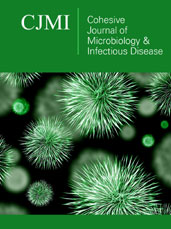- Submissions

Abstract
Cohesive Journal of Microbiology & Infectious Disease
Exploration of Bioinformatics Approaches to Investigate DPP4 is a Promising Binding Receptor in SARS CoV-2
-
Open or CloseSaher Javaid1, Toheed Fatima2, Maryam Fatima3, Muhammad Yaqoob4, Imran Zafar5*, Kompal Fayyaz6, Quratul Ain7 and Waqas Yousaf8
1KAM school of life sciences, Forman Christian College Pakistan, Pakistan
2Department of Health informatics, COMSATS University Islamabad, Pakistan
3Department of Biotechnology, Virtual University of Pakistan, Pakistan
4Department of Life Sciences, ARID University, Pakistan
5Department of Bioinformatics and Computational Biology, Virtual University, Pakistan
6Department of National Centre for Bioinformatics, Quaid-I-Azam University Islamabad, Pakistan
7Department of Chemistry, Government College Women University Faisalabad, Pakistan
8Department of Botany, The University of Lahore, Pakistan
*Corresponding author: Imran Zafar, Department of Bioinformatics and Computational Biology, Virtual University Pakistan, Pakistan
Submission: March 09, 2023; Published: May 09, 2023

ISSN: 2578-0190 Volume6 Issue4
Abstract
The pandemic infection of Severe Acute Respiratory Syndrome Coronavirus 2 (SARS-CoV-2) has been rapidly increasing the number of patients afflicted with coronavirus disease 2019 (COVID-19) since December 2019. It has been reported that the entry receptor for SARS-CoV-2 is unequivocally Angiotensin- Converting Enzyme 2 (ACE2). However, it remains an open question whether ACE-related inhibitors or drugs can modify ACE2 activity and affect the viral activity and disease severity of SARS-CoV-2. This study was undertaken to determine the most promising binding receptor DPP4 with ACE2 to counteract its interaction with SARS-CoV-2 viral infection. To achieve this, Insilco studies were conducted based on retrieved data from various online databases. Molecular docking analyses have demonstrated that the spike protein Receptor Binding Domain (S-RBD) of SARS-CoV-2 efficiently binds to the DPP4 receptor, especially to the S-RBD vital residues of the RBP-binding motif located in the DPP4 receptor. Consequently, DPP4 may play a crucial role in elucidating the common pre- and post-COVID-19 symptoms of unknown etiology. This study also investigated the potential of epicatechin as a potent natural inhibitor that can be utilized to block or at least weaken the SARS-CoV-2 entry and its subsequent invasion. However, in vitro experiments are necessary to validate the effectiveness of epicatechin against the activity of the human ACE2 receptor.
Keywords: COVID-19; SARS-CoV-2; DPP4; ACE2; Spike protein; S-RBD
 a Creative Commons Attribution 4.0 International License. Based on a work at www.crimsonpublishers.com.
Best viewed in
a Creative Commons Attribution 4.0 International License. Based on a work at www.crimsonpublishers.com.
Best viewed in 







.jpg)






























 Editorial Board Registrations
Editorial Board Registrations Submit your Article
Submit your Article Refer a Friend
Refer a Friend Advertise With Us
Advertise With Us
.jpg)






.jpg)














.bmp)
.jpg)
.png)
.jpg)










.jpg)






.png)

.png)



.png)






